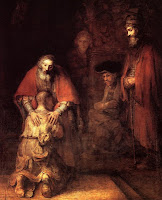My rating: 4 of 5 stars
The narrator of Life of Pi tells us that his story will make its hearers "believe in God." I'm not sure any story can quite live up to that. However, this novel's journey certainly isn't limited to what the protagonist endures at sea.
The novel is divided into three sections. Each is named for a place, which is a bit ironic, since the protagonist's sense of place has been disturbed by the events of his life. In the first section, "Toronto and Pondicherry," we meet Pi as the adult looking back over his life and story. He tells about his desire to learn about religion and how he become Christian, Muslim, and Hindu at once. This part provides most of the comic part of the story, but also lets us in on what sort of person young Pi is before the tragedy that marks his life.
Part Two, "The Pacific Ocean," is the longest part of the book. It tells of the accident which brought Pi to be lost at sea with Richard Parker, a Bengal tiger. (On board the lifeboat is also a severely injured zebra, and orangutan, and a hyena, but they don't last long.) This is where the narrative really takes off, as one might expect. Having no nautical training or knowledge of survival skills, I cannot tell how realistic this adventure really is. However, Martel's narrator is so detailed about what he does to fashion a raft, catch turtles and fish to eat, and training the tiger, that I could not help but believe it all was true. The prose here is striking and vivid, better than the first section, the reader left to believe on the story's own merits.
The last section is called "Benito Juarez Infirmary, Tomatlan Mexico." It is here where Pi, after 227 days lost at sea, finally finds civilization. While recuperating in a hospital, he is visited by two men representing the Japanese company who owned the downed ship. They do not believe his tale of survival with a tiger and there is an interesting argument about what it means to believe. Pi offers a different version that seems more plausible, but even darker than what readers are likely to think actually happened. At this point, I'm not sure whether we are supposed to choose which version is real. I also cannot decide whether I like that an alternate story has been offered or why.
I can say that for most people the middle section of Life of Pi is going to be the part of the story that most readers will hang on to and remember. But the other two sections are important and keep this from being a mere adventure story. Without them, we only have an incredible physical journey. And most as most of our philosophies and religions teach us, the body is only one segment of the self.
View all my reviews
































